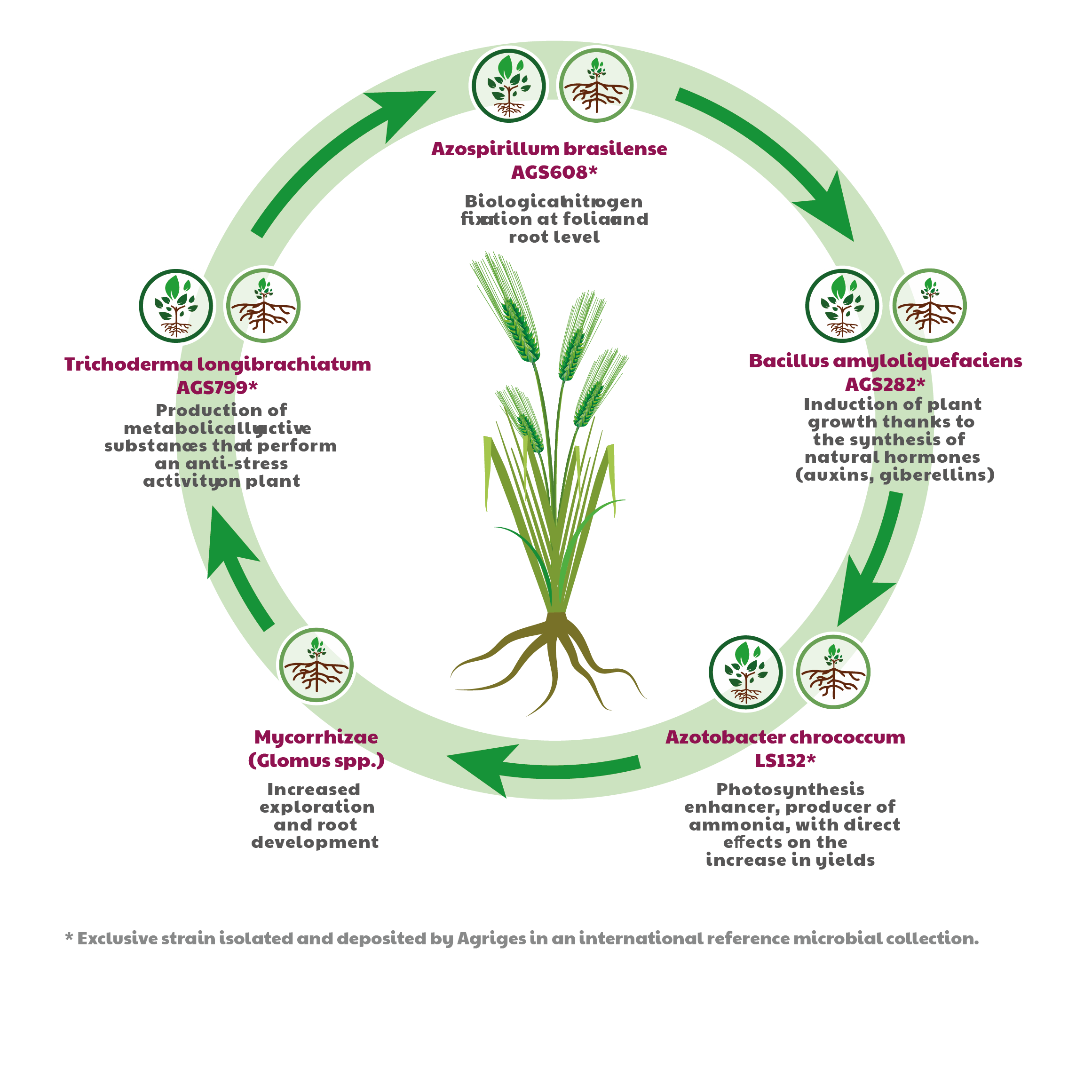Nitrogen fixers: the key role in sustainable agriculture
Nitrogen Fixers: Benefits, Applications, and Innovations in Agriculture
Nitrogen fixers play a fundamental role in modern agriculture, particularly in improving soil fertility and reducing dependence on chemical fertilizers. These microorganisms, through the process of nitrogen fixation, enable plants to assimilate atmospheric nitrogen, one of the essential elements for their growth. This article explores how nitrogen fixers contribute to agricultural sustainability, highlighting agronomic benefits, practical applications, and innovations like Agriges’ Azo Smart, increasingly used across various crops.
What is Nitrogen Fixation, and How Does it Work?
Nitrogen fixers are microorganisms, particularly bacteria, that transform atmospheric nitrogen into a form that plants can assimilate. This natural process is essential for reducing the use of chemical fertilizers and promoting the growth of more sustainable crops. There are various types of nitrogen fixers, including symbiotic bacteria like Rhizobium, which establish a direct relationship with legumes by forming root nodules that enable nitrogen fixation. Other bacteria, such as Azospirillum and Azotobacter, live freely in the soil and can interact with plant roots or leaf surfaces.
How Do Nitrogen Fixers Work?
Nitrogen fixation occurs when nitrogen-fixing bacteria convert atmospheric nitrogen (N₂) into ammonia (NH₃), which plants can use for their development. This process not only provides plants with a natural nitrogen source but also improves soil quality by promoting microbial biodiversity and nutrient cycling. Nitrogen-fixing bacteria contribute to creating a soil environment more conducive to plant growth.
Agronomic Benefits of Nitrogen Fixers

Integrating nitrogen fixers into agriculture offers numerous environmental and productive advantages. Here are the key agronomic benefits:
- Reduction in Chemical Fertilizer Use: Nitrogen fixation provides plants with a natural nitrogen supply, decreasing the need for synthetic nitrogen fertilizers. This not only reduces costs for farmers but also lowers the environmental impact associated with the production and use of chemical fertilizers.
- Improvement in Soil Fertility: Nitrogen fixers enhance soil biodiversity, promoting a more efficient nutrient cycle. They contribute to overall soil health by improving soil structure and its capacity to retain water and nutrients.
- Increased Resistance to Environmental Stress: Nitrogen-fixing bacteria stimulate plants to better defend themselves against various stresses. These microorganisms activate defense mechanisms in plants, improving their resilience.
- Productivity Enhancement: Nitrogen fixation ensures a constant supply of nitrogen for plants, promoting healthy vegetative growth and increasing agricultural yields. The benefits extend to crop quality, with more robust and productive plants.
Nitrogen Fixers in Industrial Crops: Effectiveness and Results
Nitrogen fixers are widely used in industrial crops, especially cereals. Recent studies have shown significant results with their application to crops like wheat, corn, and barley:
- Yield Increase: Crops treated with nitrogen fixers showed up to a 15% increase in yield compared to untreated crops.
- Reduction of Nitrogen Fertilizer Use by up to 30%: Thanks to nitrogen fixation, plants require less chemical fertilizer, contributing to a reduced ecological impact of agriculture.
- Improved Root Growth: Inoculation with nitrogen fixers promotes root development, enhancing nutrient uptake and plant resilience under challenging environmental conditions.
Azo Smart: Agriges’ Innovation for Sustainable Fertilization
Azo Smart is the result of Agriges’ advanced research—an innovative product leveraging the benefits of nitrogen fixers to optimize agricultural fertilization. Azo Smart is a formulation based on nitrogen-fixing bacteria designed to improve plant nutrition and reduce the environmental impact of farming. This product has shown remarkable positive effects across various applications:
Advantages of Azo Smart in Industrial Crops
In cereals, Azo Smart usage has improved vegetative growth, productivity, and sustainability. Additionally, plants treated with Azo Smart demonstrate greater efficiency in nitrogen assimilation, reducing the environmental footprint of chemical fertilizers.
Expansion to Tree Crops

New trials are extending Azo Smart’s application to tree crops such as vines, olives, stone fruits (e.g., peaches), pome fruits (e.g., apples), and nut-bearing plants. The results are highly promising:
- Improved Polyphenol and Flavonoid Content: Enhanced antioxidant properties in fruits and a general strengthening of the plant’s physiological state due to increased polyphenol and flavonoid levels, as well as total antioxidant activity.
- Increased Resistance to Oxidative Stress: Azo Smart application has activated plant defense enzymes, such as superoxide dismutase (SOD) and catalase (CAT), boosting protection against oxidative stress.
- Better Fruit Quality and Shelf Life: Azo Smart usage has also improved fruit quality, leading to better preservation—an essential factor for cold storage.
Conclusion: The Future of Nitrogen Fixers in Agriculture
Nitrogen fixers represent a key resource for sustainable agriculture. Their use not only reduces the need for chemical fertilizers but also improves soil quality and agricultural productivity. Innovations like Agriges’ Azo Smart open new horizons, making agriculture more efficient and environmentally friendly. With the expansion of applications to tree crops and the adoption of sustainable farming practices, nitrogen fixers are set to play an increasingly central role in the future of global agriculture.
If you have any questions or need further information, our team is always ready to assist you. Contact us on our social media and continue following us to stay updated on the latest news about organic and integrated agriculture!



